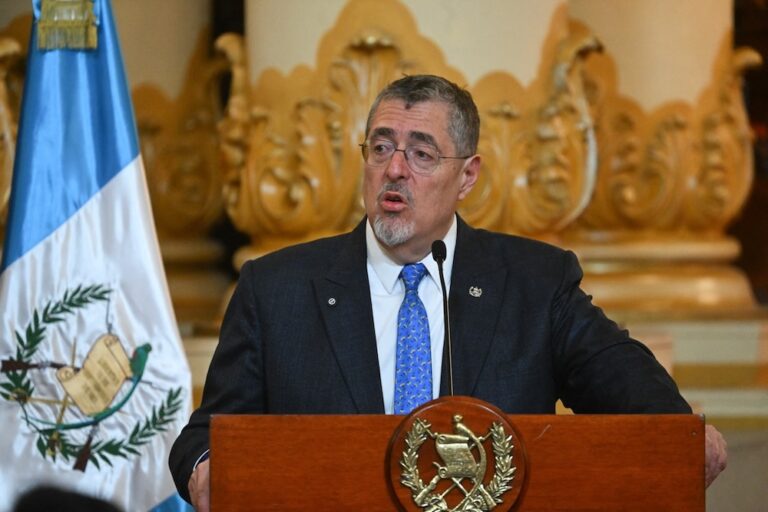Being a women's rights activist in the country with the third highest rate of femicides in the world can be a deadly task. One that Norma Cruz has courageously taken on for the last 15 years.
Violence against women is not just a problem for women. It’s a problem that men and women have to work together to solve.
Adriana Estrada, 26, from Mixco City, Guatemala, was married to Jorge Armando González; they had two small boys. Jorge was violent, and Adriana had gone to the police several times after being beaten by him. On the night of January 14, 2012, Jorge beat and strangled Adriana to death at home as their eldest son listened from his bedroom.
“Marta” (a pseudonym), 16, was walking home from school on the afternoon of 10 August 2014. A neighbour, 36-year-old Tulio Reyes Carrera appeared, brandishing a machete. He had become obsessed with Marta and had threatened her several times. Reyes slashed at her repeatedly, leaving her horrifically injured. Later at the hospital, doctors marvelled that Marta had survived the attack. Today, her whole body is disfigured by scars.
María Alejandra Oseida Vásquez, a schoolgirl, disappeared on the morning of 18 July 2013. Family and neighbours spent the whole day combing the neighbourhood until they found her that night, dead. Maria had been raped and strangled by her grandfather.
Jorge received a twenty-five year jail sentence for murdering Adriana. Reyes was given twenty years for the attempted murder of Marta (who is still undergoing psychological and physical therapy). Maria’s grandfather was sentenced to a total of 65 years in jail.
These examples of justice done are rare in Guatemala, where impunity is the norm for those who attack women. What each of these cases have in common – apart from the almost unimaginable violence inflicted – is that the families were provided with either free legal representation, psychological therapy or other support by Fundación Sobrevivientes (Survivors’ Foundation), a Guatemala City-based women’s rights organisation. Fundación Sobrevivientes has been led by the lawyer and award-winning women’s rights activist, Norma Cruz, for more than 15 years.
Violence towards women is endemic in Guatemala, and the statistics paint a chilling picture. In 2015, the National Institute of Forensic Science reported that 766 women had been murdered that year, with 774 killed the preceding year. Guatemala’s femicide rate is approximately 9 per 100,000 women, the third highest femicide rate in the world.
Norma Cruz did not set out with an ambition to become the head of Guatemala’s leading women’s rights NGO. Rather, it was her own family’s personal experience of sexual violence, and of the lack of provision for victims, that made her realise that something needed to be done. As she recalled in a 2015 interview:
“It all started in 2001, when I was seeking justice for my daughter – she was a victim of sexual violence. I met other mothers who were also demanding justice for their daughters and who were in the same situation that I was… later, we formed an association, and, working out of my house, we began bringing our first cases on behalf of victims of sexual violence to the law. In 2005, we went public and started to plan for a centre that would provide assistance to female victims of violence, including free legal and psychological support…”
Under Cruz’s leadership, Fundación Sobrevivientes has achieved all this, and now even fights for mothers whose babies are stolen and sold off into illegal adoption networks. The organisation currently provides assistance to approximately 1,500 women each year.
Many have attempted to explain the horrendously high level of violence directed at women in Guatemala. It is sometimes suggested that the 36-year-long Guatemalan Civil War (1960-1996) numbed Guatemalan society to a certain level of violence, making it almost acceptable. Cruz, too, views the war as a causal factor, but she spreads the blame further, pointing to the conservative machismo so prevalent in her country: “We are dealing with this kind of violence [but] we have a very conservative society that prefers that all be kept silent,” she said in a PBS interview in 2011: “The doubt always exists about women telling the truth…they don’t believe her [and] she is considered guilty of what has happened.”
Working in this kind of environment, and speaking publicly the way she does, it was predictable that Cruz would become a target for the type of men she defends women against. She began receiving death threats in 2009, when her organisation got involved in the case of a girl who was raped, and they have continued to this day. In 2011, the offices of Fundación Sobrevivientes were attacked with a Molotov cocktail.
Because of the work of activists like Cruz, there has been some progress in dealing with violence directed at women. In 2008, Guatemala became the first country to officially recognise femicide; it now has 11 femicide tribunals. However, with approximately 56,000 reports every year of attacks on women, the desperate need for organisations like Fundación Sobrevivientes shows no sign of abating. As Cruz says, “The day when we no longer feel the pain of the families and of the victims of abuse is the day I’ll close the Foundation.”



